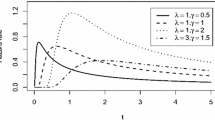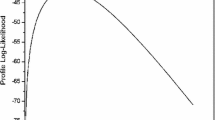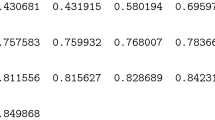Abstract
Progressive censoring has become popular in recent years. In this paper, Type-II progressive censored Erlang distribution has been used for Bayesian estimation and maximum likelihood estimation. Method of elicitation has also been employed by using prior predictive distributions to compute the values of hyperparameters. Moreover, real-life data and rigorous simulation schemes have been exercised for Bayesian shrinkage estimates, Bayesian estimates, and maximum likelihood estimates along with their associated posterior risks. Furthermore, the results of Bayes estimates are obtained by using a generalized entropy loss function. During this meticulous exercise, it has been observed that by increasing the effective sample size \(n\), risks become decrease and the Bayes estimates turn out to be closer to the true value of the parameters. But at the same time, both Bayes estimates and risks are not affected by changing the sample size \(m\). Additionally, Bayesian shrinkage estimation is more tractable than Bayesian estimation and maximum likelihood estimation especially when prior information about the parameter is known in the form of point guess value.


Similar content being viewed by others
References
Abernethy RB (2006) The new Weibull handbook, 5th edn. Open Library, North Palm Beach, FL
Al-Hemyari ZA, Al-Dabag HA (2012) A class of shrinkage T estimators for the shape parameter of the Weibull lifetime model. Pak J Stat Oper Res 8(2):167–184
Ali S, Aslam M, Kundu D, Kazmi SM (2012) Bayesian estimation of the mixture of generalized exponential distribution: a versatile lifetime model in industrial processes. J Chin Inst Ind Eng 29(4):246–269
Apolloni B, Bassis S (2009) Algorithmic inference of two-parameter gamma distribution. Commun Stat – Simul Comput 38(9):1950–1968
Aslam M (2003) An application of prior predictive distribution to elicit the prior density. J Statist Theory Appl 2(1):183–197
Bakoban RA (2012) Bayesian and non-Bayesian estimation of Erlang distribution under progressive censoring. Int J Res Rev Appl Sci 11(3):524–535
Balakrishnan N (2007) Progressive censoring methodology: an appraisal. TEST 16:211–296 (with discussions)
Balakrishnan N, Aggarwala R (2000) Progressive censoring: theory, methods, and applications. Birkhauser, Boston
Balakrishnan N, Cramer E (2014) Maximum likelihood estimation in progressive type-II censoring. In: Balakrishnan N, Cramer E (eds) The art of progressive censoring. Statistics for industry and technology. Birkhäuser, New York, NY. https://doi.org/10.1007/978-0-8176-4807-7_12
Balakrishnan N, Sandhu RA (1995) A simple simulation algorithm for generating progressive type-II censored samples. Am Stat 49(2):119–230
Bhattacharyya SK, Singh NK (1994) Bayesian estimation of the traffic intensity in M/Ek/1 queue. Far East J Math Sci 2:57–62
Calabria R, Pulcini G (1996) Point estimation under asymmetric loss functions for left truncated exponential samples. Commun Stat - Theory Methods 25(3):585600
Dey S (2009) Comparison of Bayes estimators of the parameter and reliability function for Rayleigh distribution under different loss functions. Malays J Math Sci 3:247–264
Erlang AK (1909) The theory of probabilities and telephone conversations. Nyt Tidsskrift for Matematik B 20(6):87–98
Evans M, Hastings N, Peacock B (2000) Statistical distributions, 3rd edn. John Wiley and Sons Inc, Hoboken, NJ
Friesl M, Hurt J (2007) On Bayesian estimation in an exponential distribution under random censorship. Kybernetika 1(43):45–60
Garthwaite HP, Kadane BJ, O’Hagan A (2004) Elicitation. Working paper, University of Sheffield. http://www.stat.cmu.edu/tr/tr808/old808.pdf
Gumbel EJ (1973) Statistics of extremes. Colombia University Press, New York
Haq A, Dey S (2011) Bayesian estimation of Erlang distribution under different prior distributions. J Reliab Stat Stud 4(1):1–30
Hossain A, Zimmer W (2003) Comparison of estimation methods for Weibull parameters: complete and censored samples. J Stat Comput Simul 73(2):145–153
Howlader HA, Hossain A (1995) On Bayesian estimation and prediction from reliability based on type II censored data. Commun Stat – Theory Methods 24:2249–2259
Ilyas A, Kazmi SM (2020) Socio-economic impacts of coronavirus on peripheral populations in pakistan: a study of Swat district. Working Paper, Sustainable Development Policy Institute. https://think-asia.org/bitstream/handle/11540/12763/Corona-Impact-on-Peripheral-community-final.pdf?sequence=1
Kazmi SMA, Aslam M (2019) Bayesian estimation for 3-component mixture of generalized exponential distribution. Iran J Sci Technol Transit a: Sci 43:1761–1788. https://doi.org/10.1007/s40995-018-0625-6
Kazmi SM, Aslam M, Ali S (2011) A note on the maximum likelihood estimators for the mixture of Maxwell distributions using type-I censored scheme. Open Stat Probab J 3:31–35
Kazmi SM, Aslam M, Ali S (2012) On the Bayesian estimation for two-component mixture of Maxwell distribution assuming type-I censored data. Int J Appl Sci Technol 2(1):197–218
Kazmi SM, Aslam M, Ali S, Abbas M (2013) Selection of suitable prior for the Bayesian mixture of a class of lifetime distributions under type-I censored datasets. J Appl Stat 40(8):1639–1658
Nair UN, Muraleedharan G, Kurup PG (2003) Erlang distribution model for ocean wave periods. J Ind Geophys Union 7(2):59–70
O’Reilly FJ, Rueda R (1998) A note on the fit for the levy distribution. Commun Stat – Theory Methods 27(7):1811–1821. https://doi.org/10.1080/03610929808832191
Pandey BN, Dwividi N, Pulastya B (2011) Comparison between Bayesian and maximum likelihood estimation of the scale parameter in Weibull distribution with known shape under LINEX loss function. J Sci Res 55:163–172
Prakash G, Singh DC (2006) Shrinkage estimators for the inverse dispersion of the inverse Gaussian distribution under the LINEX loss function. Austrian J Stat 35(4):463–470
Son Y, Oh M (2006) Bayesian estimation of the two-parameter Gamma distribution. Commun Stat – Simul Comput 35:285–293
Stablein DM, Carter WH, Novak JW (1981) Analysis of survival data with non-proportional hazard functions. Control Clin Trials 2(2):149–159
Suri PK, Bhushan B, Jolly A (2009) Time estimation for project management life cycles: a simulation approach. Int J Comput Sci Netw Secur 9(5):211–215
Thompson JR (1968) Some shrinkage techniques for estimating the mean. J Am Stat Assoc 63:113–122
Wu SJ, Chen DH, Chen ST (2006) Bayesian inference for Rayleigh distribution under progressive censored sample. Appl Stoch Model Bus Ind 22:269–279
Zhang LF, Xie M, Tang LC (2008) On weighted least square estimation for the parameters of Weibull distribution. In: Hoang P (ed) Recent advances in reliability and quality design. Springer, London, pp 57–84
Acknowledgements
Authors wish to thank the referees and chief editor for their valuable comments which led to improve the paper.
Funding
Authors received no specific funding for this work.
Author information
Authors and Affiliations
Corresponding author
Ethics declarations
Conflict of interest
Authors declare that they have no conflict of interest.
Ethical approval
This work does not comprise any studies with human participants or animals performed by any of the authors.
Additional information
Publisher's Note
Springer Nature remains neutral with regard to jurisdictional claims in published maps and institutional affiliations.
Rights and permissions
Springer Nature or its licensor holds exclusive rights to this article under a publishing agreement with the author(s) or other rightsholder(s); author self-archiving of the accepted manuscript version of this article is solely governed by the terms of such publishing agreement and applicable law.
About this article
Cite this article
Kazmi, S.M.A., Aslam, M. On Estimation of Type-II Progressive Censored Erlang Distribution. J Indian Soc Probab Stat 23, 565–584 (2022). https://doi.org/10.1007/s41096-022-00140-7
Accepted:
Published:
Issue Date:
DOI: https://doi.org/10.1007/s41096-022-00140-7
Keywords
- Type-II progressive censoring sampling
- Bayes estimates
- Maximum likelihood estimates
- Informative priors
- Elicitation of hyperparameters
- Generalized entropy loss function




